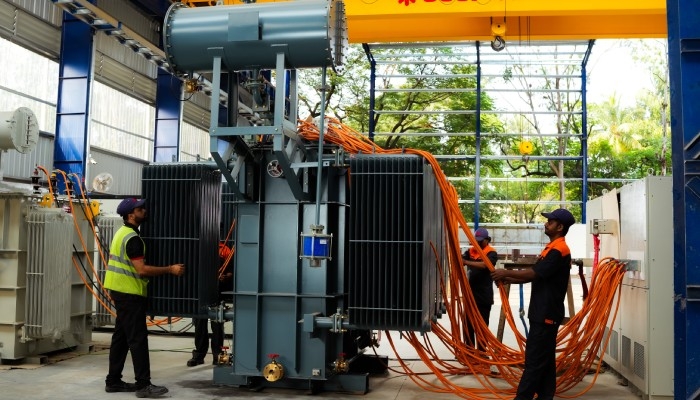Converter Transformers: Key Components in Electrical Power Conversion

Converter transformers play a critical role in the conversion and transmission of electrical power, particularly in high-voltage direct current (HVDC) systems and other advanced power technologies. These specialized transformers are designed to adapt and manage electrical energy efficiently between different voltage levels and phases. This article delves into the functionality, advantages, and applications of converter transformers, highlighting their importance in modern power systems.
What is a Converter Transformer?
A converter transformer is a type of transformer used in electrical power systems to facilitate the conversion of electrical power between alternating current (AC) and direct current (DC). Unlike standard transformers, converter transformers are designed to handle the complexities of power conversion, especially in systems involving HVDC technology.
Functionality and Design
- AC to DC Conversion: Converter transformers are integral to HVDC systems, where they help convert high-voltage AC from the power grid into high-voltage DC for long-distance transmission. They also convert DC back into AC at the receiving end of the transmission line.
- Voltage and Phase Adjustment: These transformers adjust the voltage levels between different stages of power conversion. They also handle phase shifting, which is essential for synchronizing AC and DC systems.
- Design Considerations: Converter transformers are built with specialized features to withstand high electrical stresses and accommodate the unique requirements of power conversion. Key design elements include:
○ Insulation: High-quality insulation materials to manage the high voltages and prevent electrical breakdown.
○ Cooling Systems: Advanced cooling systems to dissipate heat generated during operation, ensuring reliable performance.
○ Winding Configurations: Unique winding arrangements to support phase shifts and manage different voltage levels efficiently.
Advantages of Converter Transformers
Converter transformers offer several benefits that enhance the performance and efficiency of power systems:
● Efficient Power Conversion: They provide efficient conversion between AC and DC, minimizing energy losses and improving overall system performance.
● Voltage Regulation: Converter transformers maintain stable voltage levels during conversion, which is crucial for ensuring the reliability of power delivery.
● Reduced Transmission Losses: In HVDC systems, converter transformers help reduce transmission losses over long distances, making them ideal for connecting remote power sources with load centers.
● Enhanced System Stability: They contribute to the stability of power systems by managing the integration of AC and DC components and handling various load conditions.
Applications of Converter Transformers
Converter transformers are used in a range of applications, including:
- HVDC Transmission Systems: One of the primary applications, HVDC systems use converter transformers to convert AC to DC for long-distance transmission and back to AC at the receiving end. This technology is essential for connecting power grids over large distances and for integrating renewable energy sources.
- Frequency Conversion Systems: In applications requiring different frequencies, converter transformers facilitate the conversion of power between varying frequency levels, such as in industrial processes and specialized equipment.
- Renewable Energy Integration: They play a role in integrating renewable energy sources like wind and solar into the grid, where power conversion between different voltage and current types is necessary.
- Railway Electrification: Converter transformers are used in railway systems to convert and regulate electrical power for traction and signaling systems.
Challenges and Considerations
While converter transformers are highly effective, they face certain challenges:
● Complexity and Cost: The design and manufacturing of converter transformers are complex and costly due to their specialized requirements and high performance standards.
● Thermal Management: Effective cooling and thermal management are crucial to prevent overheating and ensure reliable operation.
● Maintenance and Reliability: Regular maintenance is essential to ensure the longevity and reliability of converter transformers, given their critical role in power systems.
Conclusion
Converter transformers are indispensable components in modern power systems, providing efficient and reliable conversion between AC and DC power. Their role in HVDC transmission, renewable energy integration, and frequency conversion underscores their importance in enhancing the performance and stability of electrical networks. As power systems continue to evolve, the advancements in converter transformer technology will play a key role in meeting the growing demands for efficient and sustainable power delivery.
- Industry
- Art
- Causes
- Crafts
- Dance
- Drinks
- Film
- Fitness
- Food
- Spiele
- Gardening
- Health
- Home
- Literature
- Music
- Networking
- Other
- Party
- Religion
- Shopping
- Sports
- Theater
- Wellness
- News


